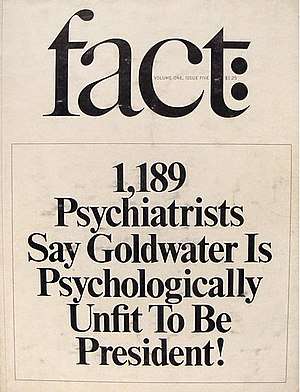Goldwater rule

The Goldwater rule is the informal name given to Section 7 in the American Psychiatric Association's (APA) Principles of Medical Ethics[1], which states that it is unethical for psychiatrists to give a professional opinion about public figures whom they have not examined in person, and from whom they have not obtained consent to discuss their mental health in public statements.[2] It is named after former U.S. Senator and 1964 presidential candidate Barry Goldwater.[3][4]
The issue arose in 1964 when Fact published the article "The Unconscious of a Conservative: A Special Issue on the Mind of Barry Goldwater".[3][5] The magazine polled psychiatrists about U.S. Senator Barry Goldwater and whether he was fit to be president.[6][7] The editor, Ralph Ginzburg, was sued for libel in Goldwater v. Ginzburg where Goldwater won $75,000 (approximately $592,000 today) in damages.[3]
Description
Section 7, which appeared in the first edition of the APA's Principles of Medical Ethics in 1973 and is still in effect as of 2018,[8] says:
On occasion psychiatrists are asked for an opinion about an individual who is in the light of public attention or who has disclosed information about himself/herself through public media. In such circumstances, a psychiatrist may share with the public his or her expertise about psychiatric issues in general. However, it is unethical for a psychiatrist to offer a professional opinion unless he or she has conducted an examination and has been granted proper authorization for such a statement.[1]
American Psychological Association
The APA Ethics Code of the American Psychological Association, a different organization than the American Psychiatric Association, also supports a similar rule. In 2016, in response to the New York Times article "Should Therapists Analyze Presidential Candidates?", American Psychological Association President Susan H. McDaniel published a letter in The New York Times in which she stated:
Similar to the psychiatrists' Goldwater Rule, our code of ethics exhorts psychologists to "take precautions" that any statements they make to the media "are based on their professional knowledge, training or experience in accord with appropriate psychological literature and practice" and "do not indicate that a professional relationship has been established" with people in the public eye, including political candidates.
When providing opinions of psychological characteristics, psychologists must conduct an examination "adequate to support statements or conclusions." In other words, our ethical code states that psychologists should not offer a diagnosis in the media of a living public figure they have not examined.[9]
American Medical Association
In the fall of 2017, the American Medical Association's Council on Ethical and Judicial Affairs wrote new guidelines into the AMA Code of Medical Ethics, stating that physicians should refrain “from making clinical diagnoses about individuals (e.g., public officials, celebrities, persons in the news) they have not had the opportunity to personally examine.”[10][11]
Violations
Regarding Donald Trump
In 2016 and 2017, a number of psychiatrists and clinical psychologists faced criticism for violating the Goldwater rule, as they claimed that Donald Trump displayed "an assortment of personality problems, including grandiosity, a lack of empathy, and 'malignant narcissism'", and that he has a "dangerous mental illness", despite having never examined him.[12][13]
John Gartner, a practicing psychologist, and the leader of the group Duty to Warn, stated in April 2017 that: "We have an ethical responsibility to warn the public about Donald Trump's dangerous mental illness."[14]
The American Psychoanalytic Association (APsaA), a different organization from the APA, sent a letter on June 6, 2017, that highlighted differences between the APA and APsaA ethical guidelines, stating that "The American Psychiatric Association's ethical stance on the Goldwater Rule applies to its members only. APsaA does not consider political commentary by its individual members an ethical matter."[15][16] In July 2017, the website Stat published an article by Sharon Begley, labeled "exclusive" and titled "Psychiatry group tells members they can defy ‘Goldwater rule’ and comment on Trump’s mental health". The article, with a photograph of Barry Goldwater as the headline image, stated that "A leading psychiatry group has told its members they should not feel bound by a longstanding rule against commenting publicly on the mental state of public figures", first sourcing the statement to the July 6 American Psychoanalytic Association (APsaA) letter, but also claiming that it "represents the first significant crack in the profession’s decades-old united front aimed at preventing experts from discussing the psychiatric aspects of politicians’ behavior"; the article then repeatedly referred to the "Goldwater rule", quoted an unnamed source as saying "leadership has been extremely reluctant to make a statement and publicly challenge the American Psychiatric Association", and claimed that an unnamed "official" had said that "Although the American Psychological Association “prefers” that its members not offer opinions on the psychology of someone they have not examined, it does not have a Goldwater rule and is not considering implementing one".[17][18] Yahoo News reporter Michael Walsh criticized the Stat article, saying it was "misleading" by stating that the letter "represents the first significant crack": The American Psychiatric Association retains the Goldwater rule, and the APsaA never had the rule and was not changing.[16] Also, even though the APsaA has no Goldwater rule for its members and allows its members to give individual opinions about specific political figures, its Executive Councilors unanimously endorsed a policy that "the APsaA as an organization will speak to issues only, not about specific political figures".[16]
See also
References
- 1 2 "The Principles of Medical Ethics With Annotations Especially Applicable to Psychiatry" (PDF) (2013 ed.). American Psychiatric Association. Retrieved April 23, 2017.
- ↑ "Ethics Reminder Offered About 'Goldwater Rule' on Talking to Media". Psychiatric News. May 18, 2007. Retrieved April 23, 2017.
- 1 2 3 "The Psychiatric Question: Is It Fair to Analyze Donald Trump From Afar?". New York Times. August 15, 2016. Retrieved August 16, 2016.
- ↑ Richard A. Friedman (February 17, 2017). "Is It Time to Call Trump Mentally Ill?". New York Times.
... psychiatrists can discuss mental health issues with the news media, but that it is unethical for them to diagnose mental illnesses in people they have not examined and whose consent they have not received.
- ↑ "ScattergoodEthics – Revisiting the Goldwater Rule". scattergoodethics.org. Retrieved August 29, 2016.
- ↑ Richard A. Friedman (May 23, 2011). "How a Telescopic Lens Muddles Psychiatric Insights". New York Times. Retrieved May 24, 2011.
- ↑ "LBJ Fit to Serve". Associated Press. May 23, 1968. Retrieved May 24, 2011.
Publisher Ralph Ginzburg, defendant in a libel suit for an article on a poll of psychiatrists on Barry Goldwater that he conducted in 1964 says ...
- ↑ Kroll, J; Pouncey, C (June 2016), "The Ethics of APA's Goldwater Rule", Journal of the American Academy of Psychiatry and the Law, 44 (2): 226–235, PMID 27236179
- ↑ McDaniel, Susan H. (March 14, 2016). "Response to Article on Whether Therapists Should Analyze Presidential Candidates". American Psychological Association. Archived from the original on 2016-04-20. Retrieved June 30, 2017.
- ↑ "Reference Committee on Amendments to Constitution and Bylaws" (PDF). American Medical Association. 2017. Retrieved January 4, 2018.
- ↑ Vox, Ford (December 7, 2017). "I'm a brain specialist. I think Trump should be tested for a degenerative brain disease". Stat. Retrieved January 4, 2018.
- ↑ Carey, Benedict (August 15, 2016). "The Psychiatric Question: Is It Fair to Analyze Donald Trump From Afar?". The New York Times. ISSN 0362-4331. Retrieved April 25, 2017.
- ↑ Steakin, William (April 21, 2017). "Dozens of psychiatry experts claim Trump has 'dangerous mental illness' at controversial conference". America Online. Retrieved April 24, 2017.
- ↑ Bulman, May (April 21, 2017). "Donald Trump has 'dangerous mental illness', say psychiatry experts at Yale conference". The Independent. Retrieved April 25, 2017.
- ↑ "Letter" (PDF) (Letter). Letter to members. American Psychoanalytic Association. July 6, 2017. Retrieved July 26, 2017.
- 1 2 3 Walsh, Michael (July 25, 2017). "Clarifying the 'Goldwater Rule' for psychotherapists in the age of Trump". Yahoo News. Retrieved July 26, 2017.
- ↑ Begley, Sharon (July 25, 2017). "Psychiatry group tells members they can defy 'Goldwater rule' and comment on Trump's mental health". Stat. Boston Globe Media. Archived from the original on July 25, 2017. Retrieved July 26, 2017.
- ↑ Begley, Sharon (July 25, 2017). "Psychiatry group tells members they can defy 'Goldwater rule' and comment on Trump's mental health". Yahoo News. Stat. Retrieved 2017-07-26.
